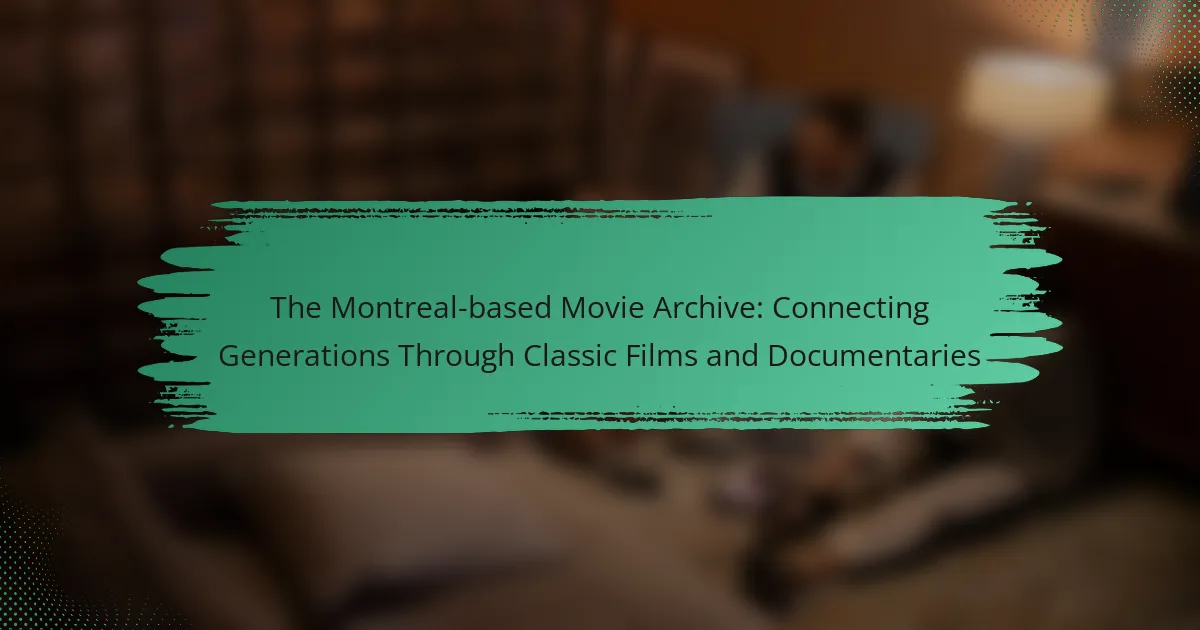The Montreal-based Movie Archive is a film preservation organization dedicated to collecting, preserving, and showcasing classic films and documentaries. Located in Montreal, Canada, it aims to connect generations through the appreciation of cinematic history by providing access to a diverse range of films that reflect various cultural and historical contexts. The organization also engages in educational initiatives to promote film literacy and fosters community involvement through screenings and events. By preserving the cinematic heritage of Montreal and beyond, the Movie Archive plays a crucial role in enhancing public appreciation for the art of filmmaking.

What is the Montreal-based Movie Archive?
The Montreal-based Movie Archive is a film preservation organization located in Montreal, Canada. It focuses on collecting, preserving, and showcasing classic films and documentaries. The archive aims to connect generations through the appreciation of cinematic history. It provides access to a diverse range of films that reflect cultural and historical contexts. The organization also engages in educational initiatives to promote film literacy. Through screenings and events, it fosters community involvement and appreciation for the art of filmmaking. The Movie Archive plays a vital role in preserving the cinematic heritage of Montreal and beyond.
How does the Montreal-based Movie Archive serve the community?
The Montreal-based Movie Archive serves the community by preserving and showcasing local film heritage. It provides access to a diverse collection of classic films and documentaries. The Archive organizes screenings and events to engage the public. Educational programs are offered to schools and community groups. These initiatives promote film literacy and appreciation among various age groups. The Archive also collaborates with local filmmakers to support new projects. By documenting Montreal’s cinematic history, it fosters a sense of cultural identity. Overall, the Archive plays a vital role in connecting generations through film.
What types of films and documentaries are included in the archive?
The archive includes classic films and various documentaries. Classic films feature significant historical and cultural importance. Documentaries cover topics such as nature, history, and social issues. The collection aims to educate and entertain diverse audiences. Each film and documentary is carefully curated for its relevance and quality. Many titles are recognized for their artistic merit and storytelling. The archive serves as a resource for film enthusiasts and researchers alike.
How does the archive select its films and documentaries?
The archive selects its films and documentaries based on historical significance and cultural impact. It evaluates films that represent important events or movements. The selection process also considers audience engagement and educational value. Additionally, the archive seeks diverse perspectives and voices in its collection. Each film is assessed for its artistic merit and storytelling quality. The archive collaborates with curators and historians for informed decisions. This ensures a comprehensive representation of cinema’s evolution. Ultimately, the goal is to preserve and share valuable cinematic heritage.
Why is the Montreal-based Movie Archive important for cultural preservation?
The Montreal-based Movie Archive is crucial for cultural preservation because it safeguards historical films and documentaries. This archive collects and maintains a diverse range of cinematic works. It ensures that significant cultural narratives are not lost over time. The archive provides access to films that reflect societal changes and artistic expression. By preserving these works, it supports research and education in film studies. The archive also fosters appreciation for local and international cinema. It serves as a resource for future generations to understand cultural heritage. This role in preservation is vital for maintaining a rich cultural landscape.
What role does the archive play in preserving local cinema history?
The archive plays a crucial role in preserving local cinema history. It serves as a repository for films, documents, and artifacts related to regional filmmaking. This preservation allows future generations to access and study local cinematic works. The archive also protects against the deterioration of films and related materials. By cataloging and digitizing these items, the archive ensures their longevity. Historical records provide context for understanding the evolution of local cinema. Additionally, the archive can facilitate public screenings and educational programs. This engagement fosters a deeper appreciation of local film heritage.
How does the archive contribute to the education of future filmmakers?
The archive contributes to the education of future filmmakers by providing access to historical films and documentaries. These resources offer insights into cinematic techniques and storytelling methods. Filmmakers can analyze the works of past masters. This analysis aids in understanding trends and innovations in film. The archive also preserves cultural heritage through film. By studying these films, future filmmakers can learn about diverse narratives. Additionally, the archive hosts workshops and screenings. These events foster community engagement and discussion around filmmaking. Overall, the archive serves as a vital educational tool for aspiring filmmakers.
How does the Montreal-based Movie Archive connect generations?
The Montreal-based Movie Archive connects generations by preserving and showcasing classic films and documentaries. This archive serves as a cultural repository where older generations can revisit films from their youth. Younger audiences gain exposure to historical cinema and diverse storytelling. The archive hosts screenings and educational programs that foster intergenerational dialogue. These events encourage discussions about themes and cultural contexts in films. By engaging with the same content, families can bond over shared viewing experiences. The archive also provides access to rare films that may not be available elsewhere. This accessibility bridges the gap between different age groups, creating a shared appreciation for cinematic history.
In what ways does the archive facilitate intergenerational dialogue?
The archive facilitates intergenerational dialogue by providing access to classic films and documentaries. These films often reflect shared cultural experiences and historical contexts. By viewing these materials, different generations can engage in discussions about their personal interpretations. The archive serves as a common ground for storytelling. It encourages younger audiences to learn from the experiences of older generations. This exchange fosters mutual understanding and respect. Additionally, curated events and screenings promote collaborative viewing experiences. Such interactions enhance the appreciation of diverse perspectives across age groups.
What programs does the archive offer to engage younger audiences?
The archive offers several programs designed to engage younger audiences. These include film screenings tailored for youth, interactive workshops, and educational outreach initiatives. Film screenings often feature classic films and documentaries relevant to contemporary issues. Interactive workshops allow participants to learn about filmmaking and film history. Educational outreach initiatives involve partnerships with schools to promote film literacy. These programs aim to foster an appreciation for cinema among younger generations.
What challenges does the Montreal-based Movie Archive face?
The Montreal-based Movie Archive faces challenges related to funding and preservation. Limited financial resources hinder its ability to maintain and restore films. Additionally, the archive struggles with the digitization of older films. This process is essential for accessibility and preservation. The lack of modern technology can complicate these efforts. Furthermore, the archive contends with the need for public engagement. Increased community involvement is crucial for sustainability. These challenges impact the archive’s mission to connect generations through classic films and documentaries.
How does the archive address funding and resource limitations?
The archive addresses funding and resource limitations through strategic partnerships and grants. It collaborates with local organizations to secure financial support. Additionally, the archive applies for government and private grants dedicated to cultural preservation. Fundraising events are organized to engage the community and raise awareness. Volunteer contributions supplement staff resources, enhancing operational capacity. The archive also implements cost-effective digital solutions to manage its collections. These strategies collectively help sustain its activities despite financial constraints.
What technological advancements are impacting the archive’s operations?
Digital preservation technologies are significantly impacting archive operations. These advancements enable the conversion of physical media into digital formats. This process ensures the longevity and accessibility of classic films and documentaries. Cloud storage solutions provide scalable options for data management. They enhance collaboration and remote access to archived materials. Metadata standards improve the organization and retrieval of archived content. Artificial intelligence aids in cataloging and searching through vast collections. These technologies collectively streamline operations and enhance user engagement with the archive’s offerings.
What can visitors expect when engaging with the Montreal-based Movie Archive?
Visitors can expect a rich collection of classic films and documentaries at the Montreal-based Movie Archive. The archive features a diverse selection of titles from various genres and eras. Visitors can engage with curated screenings and themed events. Educational programs and workshops are available for film enthusiasts of all ages. The archive also provides access to rare film materials and historical documents. Knowledgeable staff offer insights and guidance to enhance the experience. The environment fosters a sense of community among film lovers. Overall, the Montreal-based Movie Archive serves as a hub for exploring cinematic history.
How can individuals access the films and documentaries in the archive?
Individuals can access the films and documentaries in the Montreal-based Movie Archive through their official website. The archive offers a digital platform where users can browse and stream content. Users may need to create an account for full access. Membership options may provide additional benefits, including exclusive content. Many films and documentaries are available for free, while some may require a rental fee. The archive also hosts community events to showcase select films. Accessing the archive contributes to preserving cinematic history for future generations.
What events and screenings are regularly hosted by the archive?
The archive regularly hosts film screenings, workshops, and community events. Film screenings feature classic films and documentaries to engage audiences. Workshops often focus on film preservation and history. Community events aim to connect local filmmakers and audiences. These activities foster a love for cinema across generations. The archive collaborates with local organizations to enhance programming. Regular screenings provide a platform for discussion and appreciation of film art. Events are scheduled throughout the year, attracting diverse audiences.
What are some best practices for utilizing the Montreal-based Movie Archive?
Utilizing the Montreal-based Movie Archive effectively involves several best practices. First, familiarize yourself with the archive’s catalog. The catalog includes a wide range of films and documentaries. Second, utilize the search function to find specific titles or genres. This feature helps streamline your research process. Third, attend workshops or events hosted by the archive. These events often provide insights into the films and their historical context. Fourth, engage with the community through forums or social media. This interaction can enhance your understanding and appreciation of the films. Finally, consider contributing to the archive by sharing your own film-related experiences or insights. This participation helps preserve the cultural significance of the archive.
The Montreal-based Movie Archive is a film preservation organization dedicated to collecting, preserving, and showcasing classic films and documentaries. It serves the community by providing access to a diverse collection of cinematic works while promoting film literacy through educational initiatives and public screenings. The archive plays a crucial role in preserving local cinema history and fostering intergenerational dialogue, allowing audiences of all ages to connect through shared cinematic experiences. Additionally, the archive faces challenges related to funding and preservation, which it addresses through strategic partnerships and technological advancements. Visitors can expect a rich array of films, educational programs, and community events that enhance appreciation for cinematic heritage.


